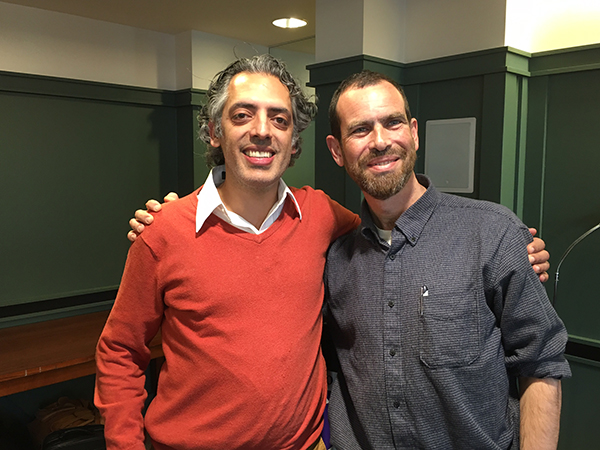Authors Urge West to Listen to Syrian Voices

The authors of a book about Syrian political society and the struggle during the current revolutionary war spoke to an audience of Emerson students and faculty on March 30 about the failure of the West to acknowledge the complete picture.
Robin Yassin-Kassab and Leila Al-Shami, who wrote Burning Country: Syrians in Revolution and War (Pluto Press, 2016), gave a talk in the Beard Room sponsored by Emerson Peace and Social Justice, Office of Diversity and Inclusion, Office of Academic Affairs, School of Communication, Department of Writing, Literature, and Publishing, and the Department of Journalism.
Most people in the West are aware of the bloodshed and destruction that has been happening inside Syria since 2011 at the hands of the Assad regime and then ISIS, as well as the 5 million Syrian refugees displaced by the violence and streaming into neighboring countries and Europe, said Al-Shami, a founding member of Tahrir-ICN, an international network that works to encourage support between revolutionary movements in the Middle East.
“These things are very visible, but there are some things that are not spoken about, and those are things we should be speaking about,” Al-Shami said.
“What’s been invisible is the internal class struggle,” she said.
Syrians in 2011 rose up against the repressive and authoritarian regime of Bashar Assad, but they also were reacting to huge wealth disparities within the country caused by years of neo-liberal economic policies and cronyism, Al-Shami said. Assad’s cousin is estimated to control 60 percent of the Syrian economy, she said.
While most of the world has been focused on the Syrians forced to flee the country, Al-Shami said there has been a strong wave of “civil activism” within the country that has taken the form of local councils, many of which are democratically elected. They’re doing everything from working on human rights issues and rescue response to maintaining electricity and garbage removal.
“We’re not hearing that in Syria today, there are hundreds of local councils throughout the liberated areas that have been democratically elected and are doing this kind of work in very challenging circumstances,” she said.
Despite Syria being conservative and patriarchal, women have had a key role in the revolution, through coordinating committees and women’s centers, which are “trying to support women’s participation in the social, economic, and political spheres,” she said.
Robin Yassin-Kassab, a novelist and media commentator on Syria who has been published in The Guardian, Al Jazeera, and The Daily Beast, talked about how the uprising morphed into a full-blown war.
The first demonstration in Damascus was just a protest against police brutality, Yassin-Kassab said, but as the regime responded to dissent with escalating violence, Syrians’ backs were to the wall.
“Was militarization a mistake? Yes, of course it was. A lot of the people knew it was a mistake even as they picked up weapons. They realized the problems this would bring with it,” he said.
“But it’s a mistake to think that the Syrians decided to militarize, that the revolutionaries all had a big meeting one day and had a vote,” he went on. “It was a million decisions made under fire, and I would argue that the regime deliberately provoked a war.”
War scares populations into “keeping quiet,” he said.
The regime instigated war by torturing people, in some cases children; by an organized mass rape campaign; and by pitting Islamic sects against each other, Yassin-Kassab said.
The rise of the Islamic State, or ISIS, in Syria is a symptom of this war, but in some areas of the country, the north especially, where resistance fighters were able to push back Assad’s forces, elected local councils have been able to form and show the world a way forward for a post-authoritarian Syria, Yassin-Kassab said.
We’re witnessing a “crisis of journalism” and “a crisis of the Left,” he said.
Over a decade ago, the West was so determined to bring its own brand of democracy to the Middle East that it invaded and occupied Iraq, said Yassin-Kassab. “Now there are Arabs in Syria under the most difficult of circumstances who are doing democracy themselves…and we don’t even know about it.”
Categories